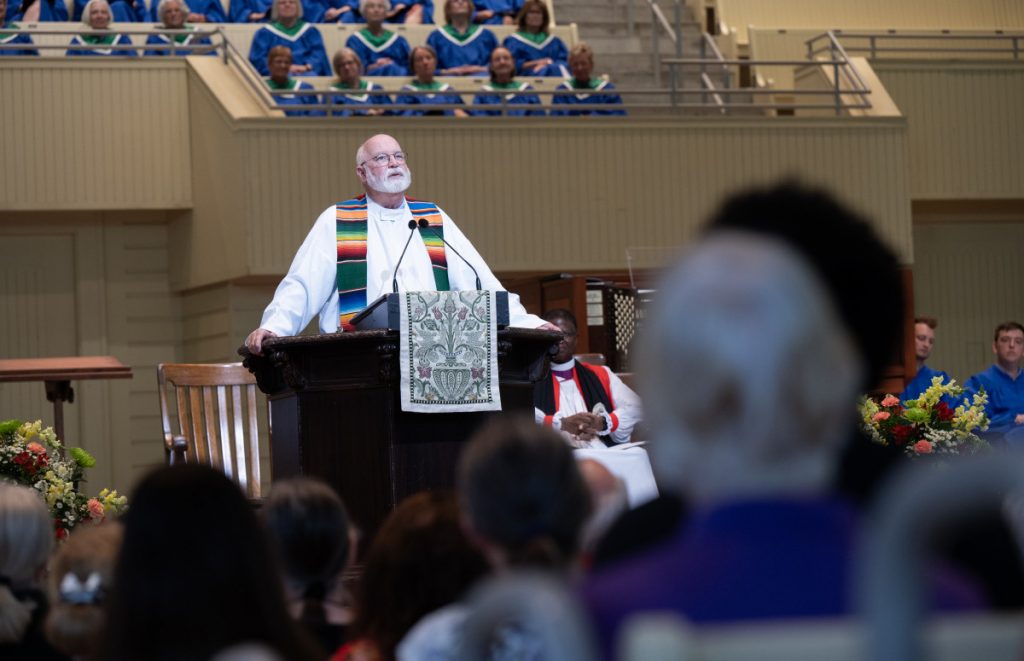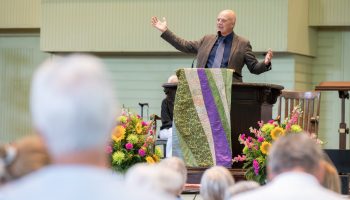
Fr. Greg Boyle, S.J. delivers his sermon.
On his way to morning worship on Wednesday, Fr. Greg Boyle, S.J. was approached by a woman who told him that after listening to his sermon on Monday, she “decided to get a CHQ tattoo.”
Boyle said, “I apologized for being a bad influence.”
Boyle preached at the 9:15 a.m. Wednesday morning worship service in the Amphitheater. His sermon title was “Mystical Activism,” and the scripture reading was Mark 7:15-20.
Years ago, people could tell a gang member by their clothing, Boyle said: “Big old baggies, size-85 Dickies, and they wore a certain t-shirt and maybe Nike Cortez shoes.”
One day Willy came into Boyle’s office and said, “I want to dress different, less gangster, more like you.”
“You mean old-fashioned and out of it?” Boyle asked.
“Exactly,” Willy said.
Boyle responded: “Glad I could inspire you.”
“By their fruits you shall know them” was the theme of Boyle’s message. Jesus, he said, was always bumping heads with the Pharisees. Jesus’ disciples did not seem to be living by the Jewish traditions as the Pharisees understood them.
“Jesus’ challenge to the purity codes came because he believed the Pharisees were pre-empting the call to justice in the scriptures,” Boyle said.
The poet Hafiz wrote, “Even after all this time, the sun never says to the earth, ‘You owe me.’ Look what happens with a love like that. It lights the whole sky.”
“By your fruits you shall know them,” Boyle said. “Most people settle for pointing (at things that are wrong). Jesus lived to point the way to the light that people can see by. We have to embrace mystical activism.”
Forty years ago in Los Angeles, Boyle said, people settled for denouncing the gangs and pointing at the violence.
“Jesus always invites us to look for the thorn underneath and then point the way (to healing). We have to address the lethal absence of hope,” he said. “Jesus stood in the path and pointed the way (to peace and hope.)”
William, often called Duke, got shot and was sitting by himself in the hospital on Christmas Day. Boyle stopped to see him and Duke said, “Merry Christmas. What did you bring me?” Boyle said, “Not a damn thing. God gave you a second chance at life.”
Duke said, “Oh, yeah, that. They told me the bullet destroyed three-quarters of my lung. That’s almost half. But who did you come to visit?”
Boyle looked at him, after admiring his grasp of equations, and said, “What? You.” Duke could not believe that someone cared about him enough to visit in the hospital.
Boyle said, “Gospel living is our agency to present God in the world. We are called to be practitioners (of grace), not museum curators. We have to take seriously what Jesus said about inclusion, non-violence and compassionate acceptance.”
He continued: “The church points to a problem and circles the wagons. Mystical activism points the way and makes the circle wider. Gandhi lived the gospel and practiced mystical activism and remained a Hindu.”
Early in his time at Homeboy, Boyle did a lot of training events for social workers who were trying to infuse hope into situations where hope was foreign, trying to heal the traumatized and provide appropriate mental health services.
Boyle had accepted an invitation in Richmond, Virginia, and had not looked closely at the letter. He thought he would be doing a keynote or workshop but realized that “I was the only speaker all damn day. As the homies say, ‘Oh, hell no.’ ”
He called upon Andre and José, who were about nine months into their training, and told them they were flying to Richmond to speak to 600 social workers. Boyle told them, “Tell you stories, take your time, all the long-ass day, to fill the time.”
José went first. He had been homeless and a heroin addict as an adult and was now working in the drug recovery program at Homeboy.
“Guess my ma and me didn’t get along,” José told the social workers. “When I was 6 she said, ‘Why don’t you just kill yourself, you are such a burden.’ ” The social workers gasped.
“It sounds worser in Spanish,” he continued. The social workers laughed. Listening to Boyle tell the story, the Chautauqua congregation had the same reactions.
José said, “When I was 9, my mom drove deep into Baja, California, and went to an orphanage and said, ‘I found this kid. Keep him.’ She left me for 90 days until my grandmother came and got me. My ma beat me every day with things you would believe and things you would not believe. My back was so bloody I had to wear three t-shirts to school to hide the blood. The kids made fun of me — ‘Hey, idiot, it’s 100 degrees out.’ But the blood would come through the first shirt and a little bit through the second shirt and finally the third shirt would cover it.”
José stopped speaking to compose himself. Boyle did the same in recounting the story on Wednesday.
José continued, “I wore three t-shirts well into my adult years. I was ashamed of my wounds; now I welcome them. I run my fingers over them; they are my friends. How can I help heal the wounded if I don’t welcome my own wounds?”
“Jesus never took the right stand but always stood in the right place with the wounded,” Boyle said. “He did not point out the problem, he pointed the way to healing the wounds. By their fruits you shall know them. Be the light people can see by. Look at what happens when the light lights up the whole sky.”
The congregation applauded.
The Rev. Natalie Hanson, retiring pastor at Hurlbut Memorial Community United Methodist Church, presided. Melissa Spas, vice president for religion at Chautauqua, read the scripture. The prelude was “Pastorale,” by Charles Villiers Stanford, played by Joshua Stafford, director of sacred music and Jared Jacobsen Chair for the Organist, on the Massey Memorial Organ. The Chautauqua Choir, under the direction of Stafford, sang a cappella “Create in me a clean heart,” music by Michael Bedford and words from Psalm 51: 10-12. The postlude was “On a theme of Orlanda Gibbons (Song 22),” by Stanford. Support for this week’s chaplaincy and preaching is provided by the Edmund E. Robb-Walter C. Shaw Fund and the Lois Raynow Department of Religion Fund.




